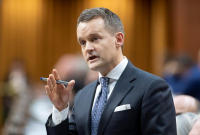Support strong Canadian climate journalism for 2025
Members of a House of Commons committee on Tuesday offered their direct help to fossil fuel giant Enbridge in its ongoing environmental dispute over the Line 5 oil pipeline.
A special committee on Canada-U.S. ties has been tasked with looking into the case of the 68-year-old pipeline that brings petroleum products across the ecologically sensitive Straits of Mackinac in the U.S. state of Michigan on its way to refineries in southern Ontario.
Michigan Gov. Gretchen Whitmer has ordered the company to cease operations in the straits by May, revoking a decades-old easement by the state. Enbridge is challenging the decision in court. The fight has attracted the attention of the federal Liberal government, which has vowed to fight diplomatically to ensure it is not shut down.
During a meeting Tuesday of the Special Committee on the Economic Relationship between Canada and the United States, Liberal MP Anthony Housefather told Enbridge executive vice-president Vern Yu, who was appearing as a witness, how strongly he felt that the government and committee members “do everything in our power” to keep the pipeline operational.
“What can the committee and its membership — not the government of Canada now, but the committee and its membership — what can we best do to help Enbridge in your desire to continue operating the line?” Housefather asked Yu.
“How can our membership be useful? In terms of talking to representatives in Michigan, in terms of — just, let us know,” he said.
Yu responded that it was important for Canadian politicians to engage with U.S. federal and state government officials, so they understand Enbridge’s position.
The company believes its proper regulator should be federal, not state authorities, and has touted the importance of the pipeline to the “energy security” of the Great Lakes region. It has said shutting down the line will have “immediate and severe consequences on the economies of Michigan, Ohio, Ontario, and elsewhere.”
Enbridge also wants to build a tunnel under the straits to house new pipe segments that it says will be a much better solution than the present situation, where the pipeline runs across the lake bottom.
Whitmer, however, has said the continued use of Line 5 constitutes an “unacceptable risk of a catastrophic oil spill” in the Great Lakes. The pipeline has been dented in the past, and has needed anchor supports to hold it in place, leading environmental and Indigenous groups to raise concerns.
The group Clean Water Action says Enbridge’s comments amount to scare tactics and a “fiction that the sky will fall and people will freeze” without the pipeline, according to an Associated Press report.
The governor has not wavered from her position, releasing a plan this month to address objections to Line 5 being shut down on account of its supply of propane to Michigan homes.
The state plans to invest in rail and propane storage, as well as turn towards renewable energy sources, while finding new suppliers, AP reported.
During Tuesday’s meeting, NDP MP Daniel Blaikie also told Yu he felt there was “pretty widespread agreement around the (committee) table” when it came to support for the Line 5 pipeline.
“Whatever our positions around transitioning to a different kind of energy economy might be, suddenly shutting off a significant amount of the current supply is not going to go well, not just for the industry, but for all the people who work in that industry, and for the people who depend on that product for their business, and heating their homes and wherever else that product ultimately lands,” said Blaikie.
Later, he asked Yu, “in terms of things that the committee might be able to recommend, above and beyond what has already been committed, are there any extant initiatives that provincial (governments) or the federal government might take from within Canada in order to try and arrive at an outcome that would see Line 5 continue to operate until a replacement pipeline is built?”
Yu responded that “we need to keep the diplomatic channels open, we need to file all the briefings we need to file in court, and we need to ensure that we let Canadians know that all of us collectively are looking after their best interests.”
The first legal hearing concerning jurisdiction, whether the case should be heard in federal or state court, is scheduled for May 12, said Yu.
Carl Meyer / Local Journalism Initiative / Canada’s National Observer






Comments